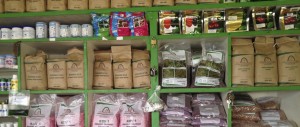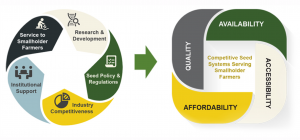The African Seed Access Index
 TASAI – The African Seed Access Index
TASAI – The African Seed Access Index
The central objective of TASAI is to promote the creation and maintenance of enabling environments for competitive seed systems serving smallholder farmers. It is this enabling environment that TASAI seeks to measure, track, and compare across African countries. The intended outcome of this index is improved access to locally adapted, affordable, and high-quality seed of improved varieties by smallholder farmers in Sub-Saharan Africa.
Timely availability of improved seeds at affordable prices is critical to improving food security, resilience, and livelihoods for smallholder farmers in Africa. Improved seeds can deliver state of the art technology to farmers including higher yields, disease and pest resistance, climate change adaptation, and improved nutrition. Over the last two decades, formal seed systems in Africa have been gradually liberalized resulting in increased participation of private seed enterprises (multinationals, regional and domestic companies). TASAI is concluding studies in 13 African countries namely Ghana, Senegal, Ethiopia, Kenya, Uganda, Tanzania, Democratic Republic of Condo, Malawi, Zimbabwe, Zambia, Mozambique, South Africa and Madagascar.
- The African Seed Access Index (TASAI) monitors indicators that are essential to seed sector development at national level.
- TASAI gives an annual scorecard on the vibrancy or competitiveness of the formal seed sector.
- TASAI is a useful tool for policy makers, development agencies, seed enterprises, and ultimately farmers.

Focusing on Africa, TASAI advances Sustainable Development Goal 2, to “End hunger, achieve food security and improved nutrition, and promote sustainable agriculture”.
TASAI is a tool that is designed to monitor and evaluate the structure, conduct, and performance of seed systems serving smallholder farmers in Africa. TASAI is currently being used by practitioners in the public sector, private sector, and development aid agencies to both inform and compel change.
Public Sector: The primary audience for TASAI is public policy makers, regulators, and law enforcement agencies involved in the seed system value chain. Implementing institutions such as ministries of agriculture, seed inspection services, and agricultural research institutions can also use TASAI to benchmark their performance.
Private Sector: TASAI can be used by seed companies and other value chain players to identify investment opportunities in the African seed value chain. Key stakeholders may also use this tool to potentially advocate for a better enabling environment.
Development Aid Agencies: For NGOs and other development agencies working in rural agricultural development, TASAI can highlight issues that need to be addressed in order to ensure access to improved seed by smallholder farmers. TASAI can serve as a tool for donors to highlight critical areas within the seed value chain in which improvements and actions can be focused on.
To know more, please visit the TASAI website here
